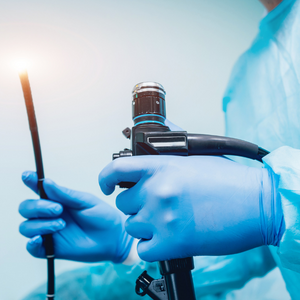Surveillance Colonoscopy

Ulcerative colitis is a chronic inflammatory bowel disease that affects the colon and rectum. In people with ulcerative colitis, the risk of developing colon cancer is higher than in the general population. The reason for the increased risk of cancer in people with ulcerative colitis is thought to be related to the chronic inflammation that occurs in the colon and rectum as a result of the disease. Inflammation can lead to the development of precancerous changes in the cells of the colon, which can eventually progress to cancer if not detected and treated early.
The risk increases with the length of time someone has had UC and how much of the colon is affected. People with ulcerative colitis who have had the disease for more than eight years or who have extensive involvement of the colon are at higher risk. It’s also important to note that people with ulcerative colitis are at a higher risk of developing colon cancer even when their disease is in remission, which emphasizes the importance of regular surveillance colonoscopy.
People with UC should have a colonoscopy after living with the condition for about eight years, and then regularly every one to three years afterwards. The main treatment is surgical removal of the cancerous area, followed by possible chemotherapy, radiation therapy, or both, depending on the stage of the cancer.
Factors Associated with an Increased Risk
- Longer duration of colitis.
- Greater extent of colonic involvement.
- Family history of colorectal cancer.
- Primary sclerosing cholangitis.
- Severity of inflammation that is defined endoscopically and histologically.
- Presence of precancerous polyps.
Patients with primary sclerosing cholangitis or PSC need colonoscopies every year as soon as they are diagnosed as the risk of colon cancer in these patients is higher.
FAQs
The recommended frequency of colonoscopy for ulcerative colitis is based on your risk. If you have very high risk factors, like primary sclerosing cholangitis or over 20 years of ulcerative colitis, you should have an annual colonoscopy.
People with ulcerative colitis are more likely to develop colorectal cancer compared to the general population, but they are also about half as likely to die from the disease.
After an initial colorectal cancer screening, regular surveillance through repeat colonoscopies is recommended every 1-3 years after having the condition for 8 years. Patients with primary sclerosing cholangitis need colonoscopies yearly as soon as they are diagnosed.
If caught early, colorectal cancer is very treatable. Treatment can include surgical removal of the cancerous area, followed by chemotherapy, radiation therapy, or both depending on the stage of cancer.
Precancerous polyps are usually easy to spot with a colonoscopy in people without ulcerative colitis, but they can be harder to find in people with ulcerative colitis because the colon is already irritated and inflamed.
The risk of colorectal cancer depends on how long the inflammation of the colon lining has been going on and how much of the colon is affected. Other risk factors include a family history of colorectal cancer, obesity, and smoking. Primary sclerosing cholangitis significantly increases the risk.
Yes, patients with extensive Crohn’s colitis also have an increased risk of colorectal cancer and should undergo regular surveillance.
At present, colonoscopy is the best and most widely used method to detect dysplasia and cancer in inflammatory bowel disease patients.
The recommended frequency of colonoscopy is based on your risk. For those at very high risk, like those with primary sclerosing cholangitis or more than 20 years of ulcerative colitis disease, it is recommended to have an annual colonoscopy. For others, it is recommended to have colonoscopies every one to three years after 8 years of ulcerative colitis. Patients with primary sclerosing cholangitis should get yearly colonoscopies.